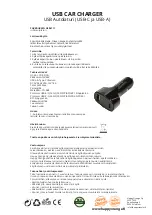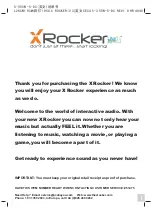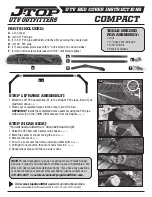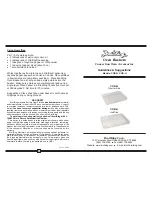
4.2 SERIAL OUTPUT
The 61302L may be configured for either full-duplex RS-232
or half-duplex RS-485 serial communication. For RS-232
serial communication, both jumpers at P3 must be in position
‘2’. For RS-485 serial communication, both jumpers at P3
must be in position ‘4’. Jumper location details appear in the
Appendix A Wiring Diagram.
Standard baud rate is 9600 but any of several available baud
rates between 1200 and 38400 may be used.
Jumpers at P1 and software parameter settings determine
serial output format.
Format
Description
Continuous ASCII
Text
(standard)
9600 baud
10 sample average
1.8 Hz output
Polled ASCII Text
9600 baud
10 sample average
Output when polled
Marine NMEA
4800 baud
10 sample average
1 Hz output
Software
Output parameters determined by
software settings
See Appendix A Wiring Diagram for details on jumper P1
configuration options and serial output examples.
In POLLED ASCII mode, the unit sends data only after
receiving a poll command. The poll command is Ma! where
‘a’ is the address value. The standard address is ‘0’ (ASCII
48) for a poll command of M0! Please see section 4.3 for
details on changing the poll address.
Upon receiving a properly addressed poll command, the unit
immediately sends data.
4.3 SOFTWARE COMMANDS
Software commands sent via serial communication may be
used to set operational parameters. The sensor must be
configured for serial communication and connected to a PC
or other compatible device using a program like HyperTerm.
New settings are stored in temporary memory and
must be burned to flash with command CMD420 to be
retained.
N o t e t h a t t h e P 1 j u m p e r m u s t b e c o n f i g u r e d f o r
SOFTWARE format to change baud rate, sample average
count, and output rate parameters.
Although the sensor may receive commands at any
time, measurement output may be paused by sending
three ESC (ASCII 27) characters or CMD300 1. While
paused, COMMAND mode is indicated by a “>” prompt.
All commands must be terminated with a carriage return
CR (ASCII 13).
2.0 INTRODUCTION
MODEL 61302L Barometric Pressure Sensor is a versatile
electronic barometer featuring high accuracy, low power,
wide operating temperature range, and calibrated 4-20 mA
output, and RS-232/485 serial data I/O.
The 4-20 mA output and RS-485 serial I/O make the
61302L ideal for commercial and industrial applications that
commonly use these signals.
Full scale current output may be set to span any portion of
the 500 to 1100 hPa operating range. Serial output options
include continuous or polled ASCII text output or NMEA
marine output. The sensor is supplied with the following
standard configuration:
Current Output 4-20 mA = 500 to 1100 hPa
RS-232 Continous ASCII text output
10 samples averaged
1.8 Hz update rate
3.0 INSTALLATION
The sensor operates over a temperature range of -40°C to
+60°C and must remain dry. Electrical connections are made
with the 5-position terminal plug included with the sensor.
Jumper settings may be used to select operating options.
Access jumpers by loosening two screws in the sensor
enclosure and removing the cover. See Appendix A for wiring
details and jumper settings.
4.0 OPERATION
Operation begins approximately 1 second after power is
applied. Output will appear after a delay determined by
the number of samples averaged and the output rate. With
default values (1.8 Hz output and 10 samples averaged),
output begins after an initial 5 second delay then remains
continuous at the 1.8 Hz rate. Parameters for output rate
and number of samples averaged may be changed using
software commands.
4.1 CURRENT OUTPUT
Calibrated 4-20 mA current output is always active. The
connection scheme appears in the Appendix A Wiring
Diagram.
The current output scale may be mapped to any part of the
500 to 1100 hPa pressure range using the IOUT HI and
IOUT LO software parameters. The standard setting maps 4
to 20 mA with 500 to 1100 hPa. With this setting:
hPa = 37.5 * mA + 350
Effective resolution is about 0.15 hPa
Greater effective resolution may be achieved by mapping
the current output to a narrower range of pressure with the
IOUT HI and IOUT LO parameters. For example, with IOUT
LO set to 950 hPa and IOUT HI set to 1050 hPa:
hPa = 6.25 * mA + 925
Effective resolution is about 0.025 hPa
Please see section 4.3 below for details on changing the
IOUT HI and LO parameters.
Summary of Contents for 61302L
Page 4: ......






















